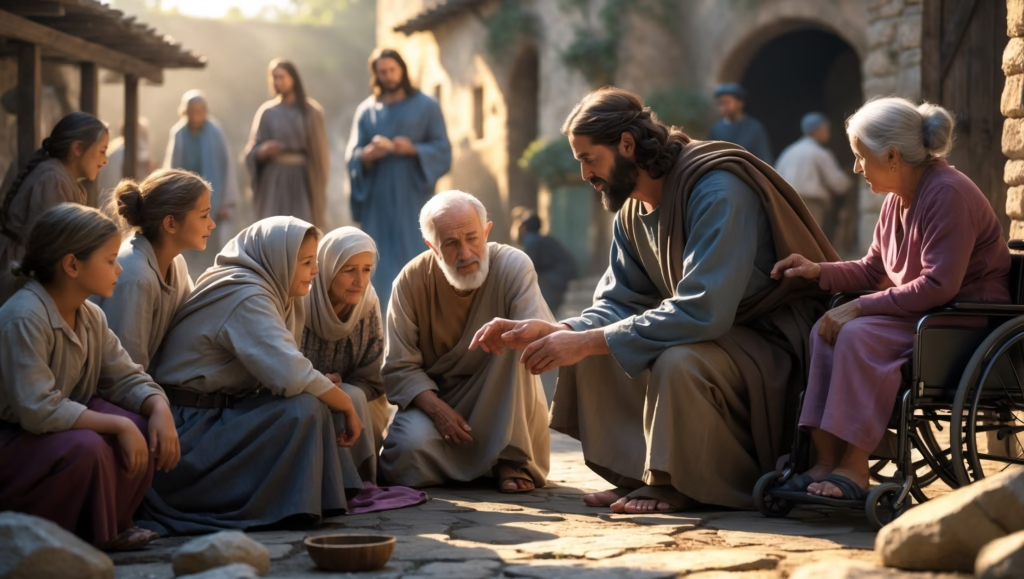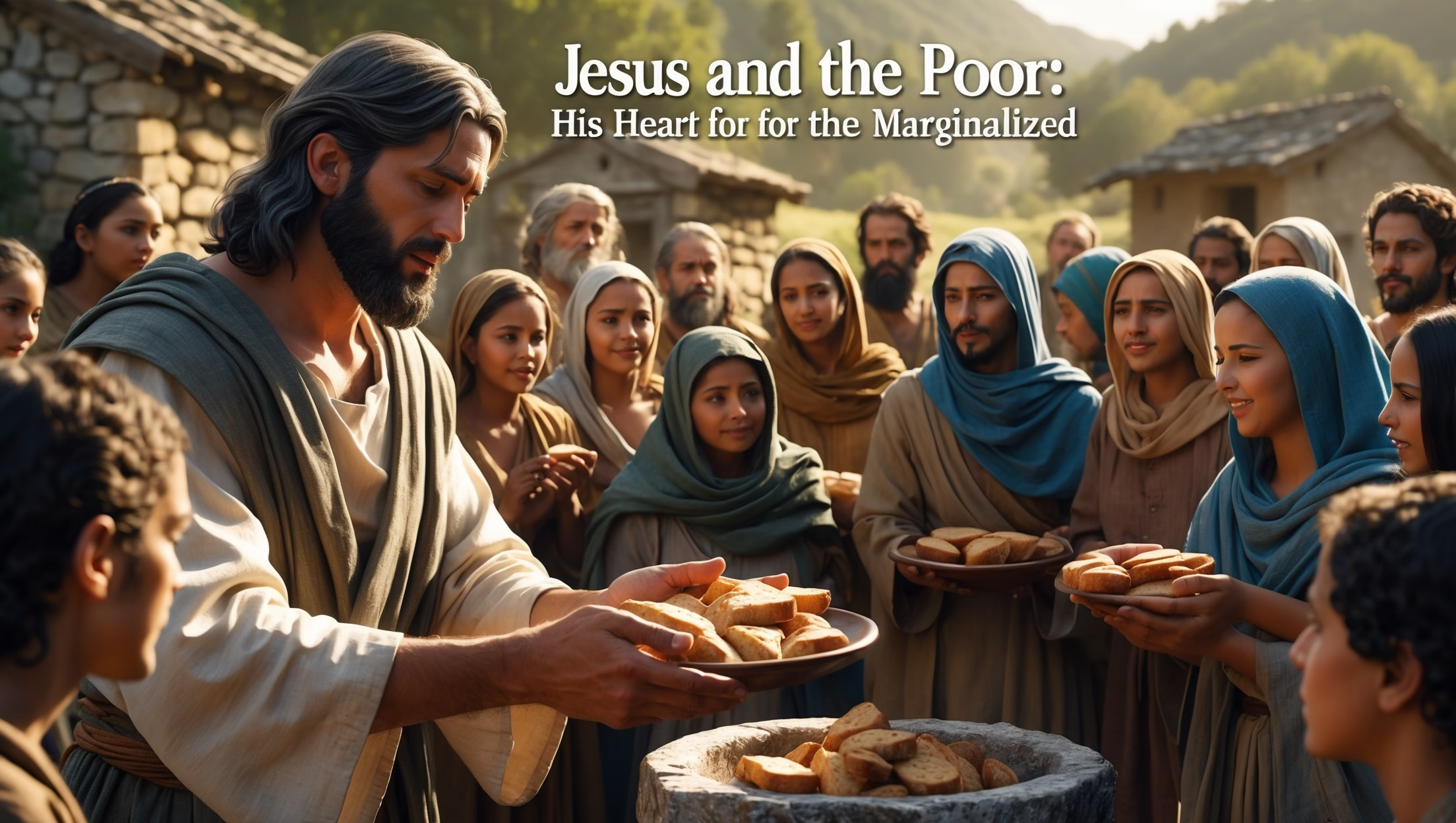Introduction
Throughout His ministry, Jesus demonstrated profound compassion for the poor, the marginalized, and those overlooked by society. In a world that often valued wealth, status, and power, Jesus consistently prioritized the needs of the vulnerable, revealing God’s heart for justice, mercy, and inclusion. His teachings and actions provide a model for the Church and believers today, showing that true discipleship involves actively caring for those in need. By examining His interactions with the poor and marginalized, we gain insight into the nature of God’s kingdom and the responsibilities of His followers. Jesus’ concern for the poor was not just rhetorical; it was deeply personal and relational, showing that every individual matters to God.

Jesus Proclaimed Good News to the Poor
Jesus began His ministry with a clear message of hope for the disadvantaged. In Luke 4:18–19, He read from the scroll of Isaiah: “The Spirit of the Lord is on me, because He has anointed me to proclaim good news to the poor.” This declaration set the tone for His mission, emphasizing that God’s kingdom elevates the lowly and prioritizes those whom society neglects. The poor are not forgotten or dismissed in God’s plan; they are central to His redemptive work. By publicly proclaiming the good news to the poor, Jesus challenged the social norms of His time, confronting systems that marginalized and excluded people. Through His words, Jesus communicated that spiritual freedom, restoration, and dignity belong to all, regardless of social status, and that God’s love is inclusive and transformative.
Jesus Served the Hungry and Sick
Jesus’ ministry was not only spiritual but also practical, addressing physical needs. He fed the five thousand with five loaves and two fish (Matthew 14:13–21) and later fed four thousand in another miraculous event (Matthew 15:32–39). These acts were more than displays of divine power; they reflected His care for human suffering and the importance of meeting basic needs. Jesus also healed the sick, including lepers, blind men, and the lame, restoring both health and dignity. By serving the hungry and sick, Jesus modeled holistic compassion, demonstrating that care for the body and spirit are inseparable in God’s kingdom. His actions showed that serving the marginalized is a tangible way to participate in God’s mission.
Jesus Warned the Rich
While showing compassion to the poor, Jesus also issued stern warnings to the wealthy. He taught that riches can become a barrier to entering the kingdom of God, stating, “It is easier for a camel to go through the eye of a needle than for someone who is rich to enter the kingdom of God” (Matthew 19:24). Wealth can foster self-reliance, pride, and neglect of the needy, making humility, generosity, and trust in God essential virtues. Jesus’ warnings encourage believers to use resources responsibly, share abundantly, and prioritize the well-being of others over material gain. He highlighted that accumulation of wealth should never replace obedience to God or compassion for others, reminding the rich that their spiritual responsibility includes addressing the needs of the poor.
Jesus Identified with the Least
In Matthew 25:31–46, Jesus explicitly identifies Himself with the marginalized. He teaches that whatever is done for the hungry, thirsty, stranger, naked, sick, or imprisoned is done for Him. This passage highlights a profound truth: serving the poor is not optional but a direct expression of love for Christ Himself. By associating with the vulnerable, Jesus elevates their status and calls His followers to a life of intentional compassion, advocacy, and action. Recognizing the inherent dignity of every person reflects the heart of God and embodies the values of His kingdom. Jesus’ identification with the marginalized also reminds believers that social, economic, and cultural boundaries do not limit God’s concern for humanity.
Lessons for Believers
Following Jesus requires more than words; it requires tangible action toward those in need. Believers are called to feed the hungry, care for the sick, advocate for justice, and challenge societal structures that oppress or marginalize. Generosity, humility, and sacrificial love are central to discipleship. By emulating Jesus’ heart for the poor, Christians participate in God’s mission of restoration, demonstrating that the kingdom of God is a present reality accessible through acts of mercy, compassion, and justice. Moreover, serving the poor develops character, deepens faith, and strengthens the community of believers. It encourages empathy, challenges entitlement, and fosters a culture of shared responsibility.
Practical Applications Today
Jesus’ example offers practical guidance for modern believers. Churches can create programs that provide food, shelter, and medical assistance to the underprivileged. Individuals can volunteer time, resources, and skills to support local and global initiatives for the poor. Advocacy for equitable policies, fair wages, and access to education reflects the same spirit of concern Jesus demonstrated. Serving the marginalized is not only an act of charity but also a reflection of God’s justice in the world. Through consistent action, believers can embody the kingdom values Jesus championed, making His teachings tangible and transformative in society.
Conclusion
Jesus’ ministry to the poor and marginalized reflects the deep compassion of God and His commitment to justice and mercy. His teachings challenge believers to prioritize the needs of the vulnerable, serve selflessly, and advocate for fairness and equality. By embracing His example, we not only honor God but also participate in transforming lives and communities. The heart of Jesus for the poor calls us to active, practical, and enduring discipleship, ensuring that His love reaches the least, the last, and the lost. By following Jesus’ example, we demonstrate that the values of God’s kingdom—mercy, justice, and compassion—are alive and active in our world today.








